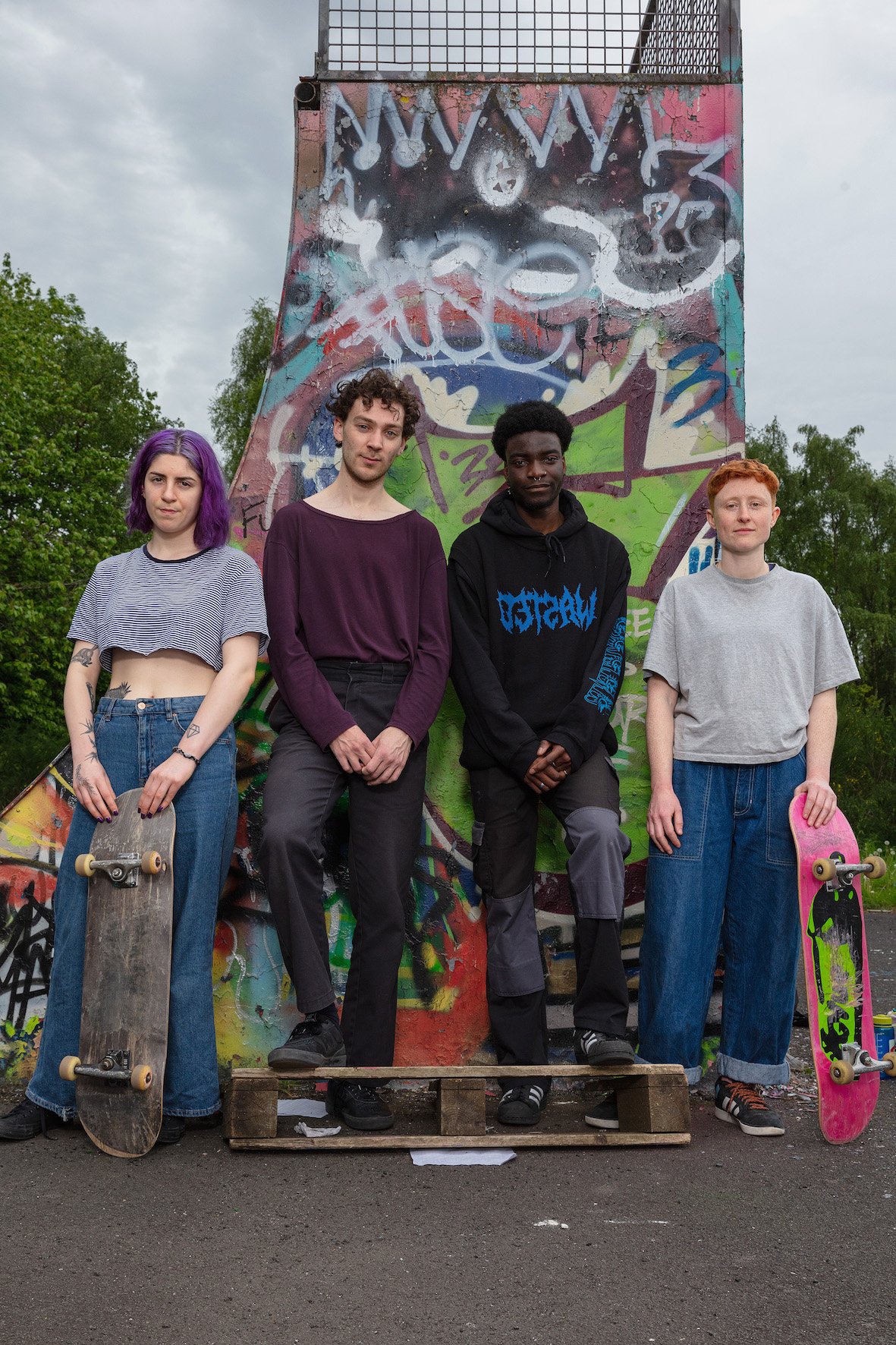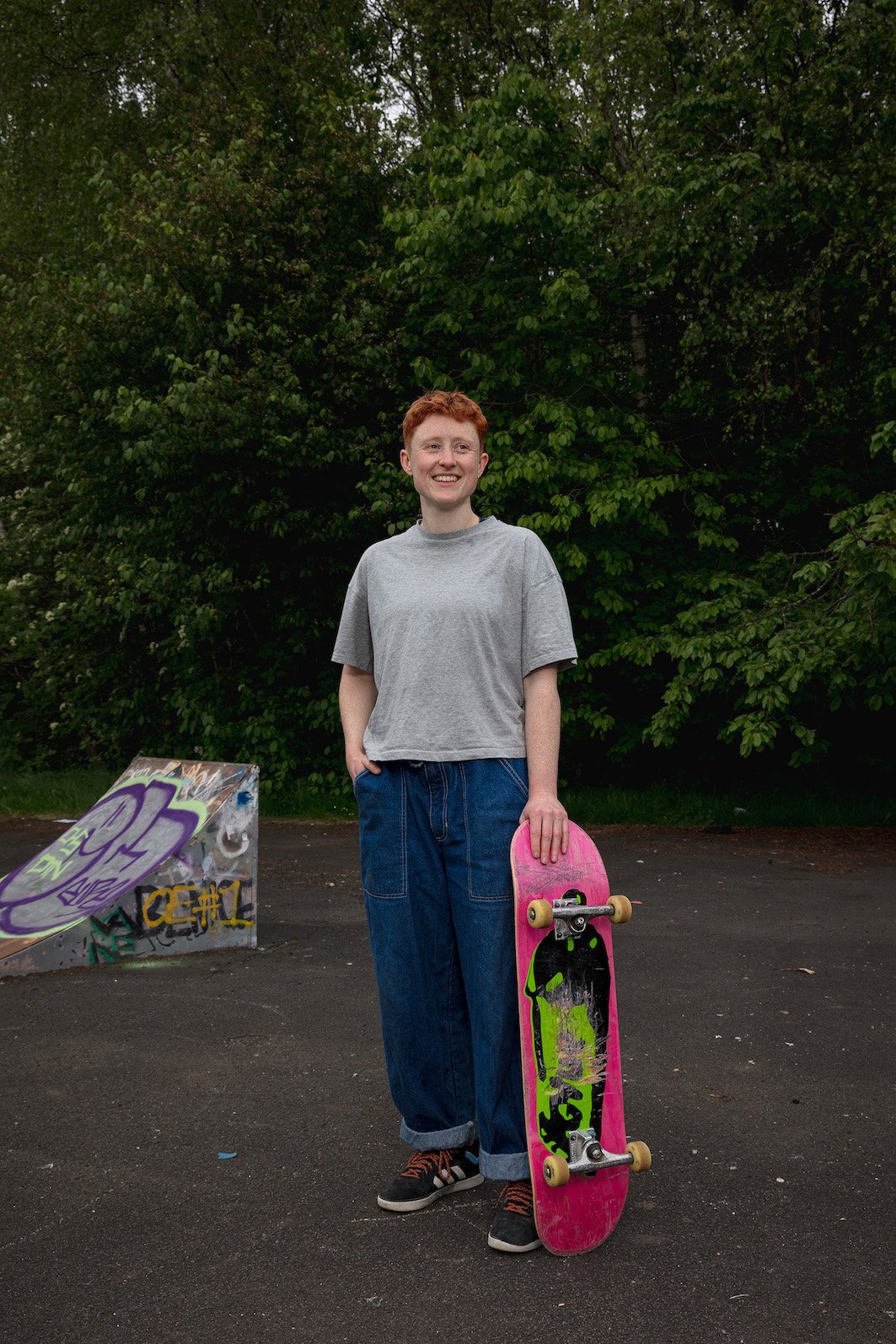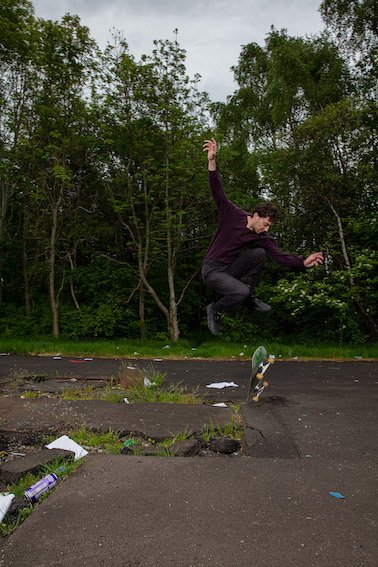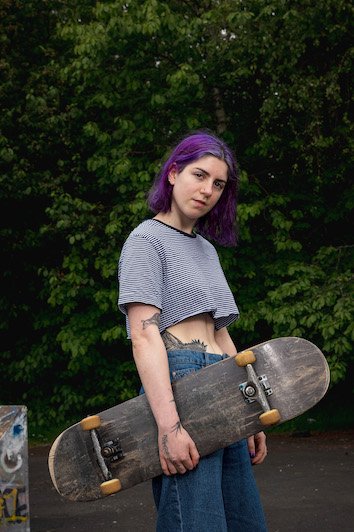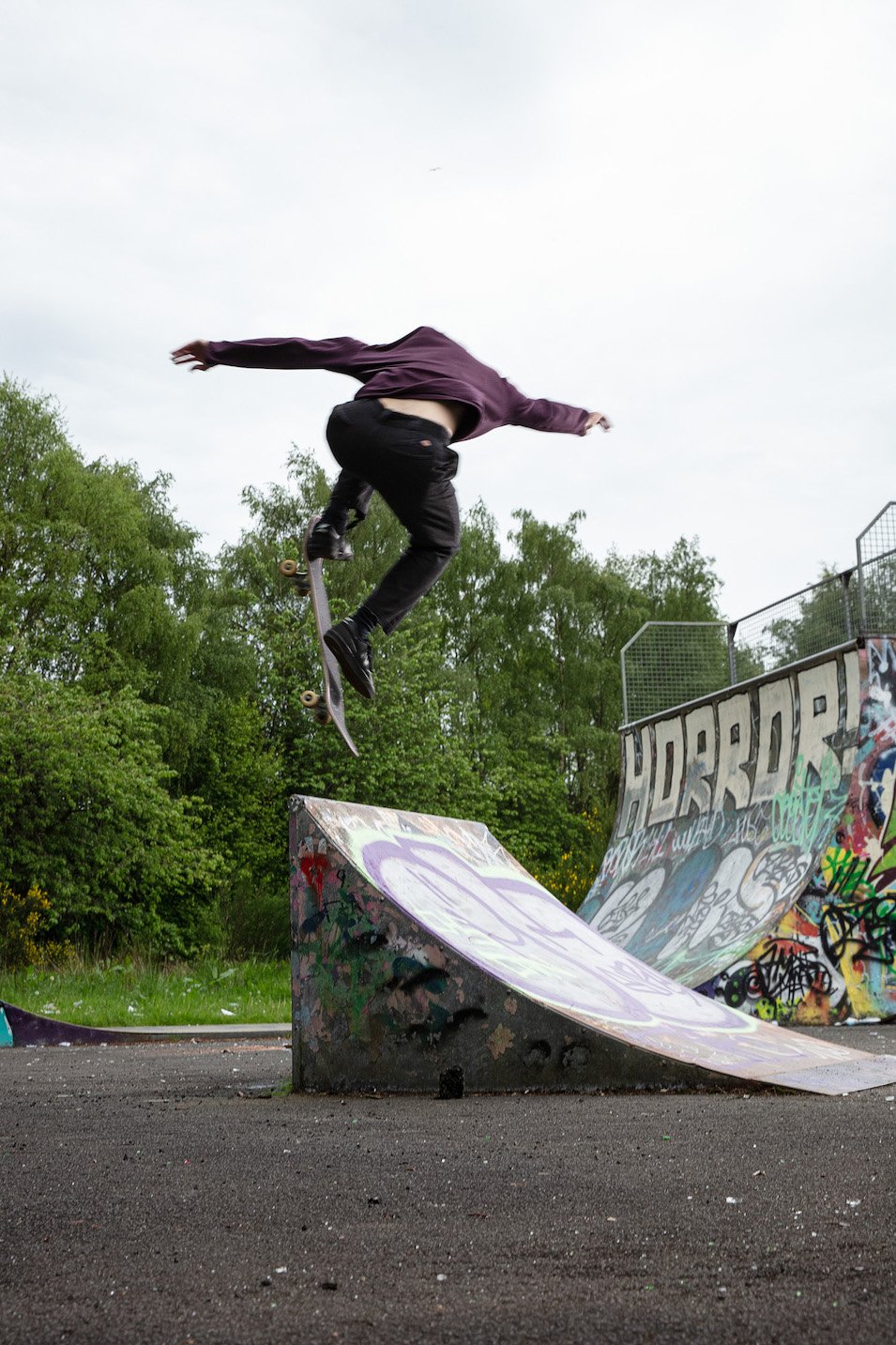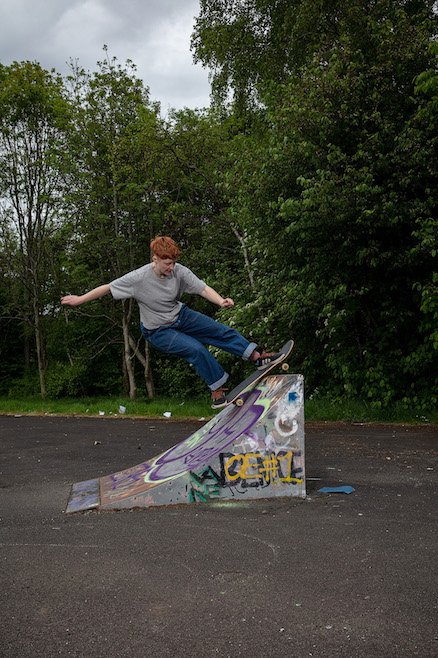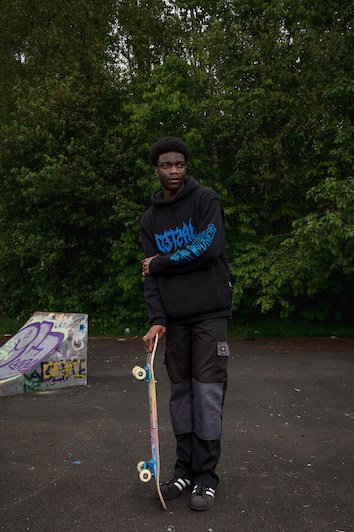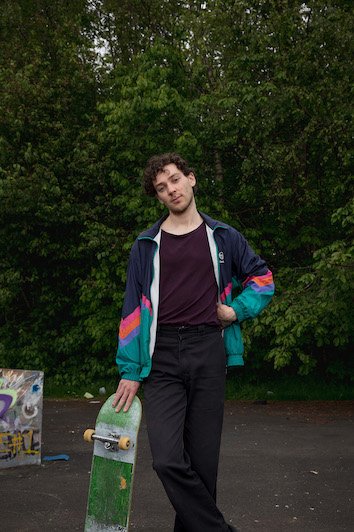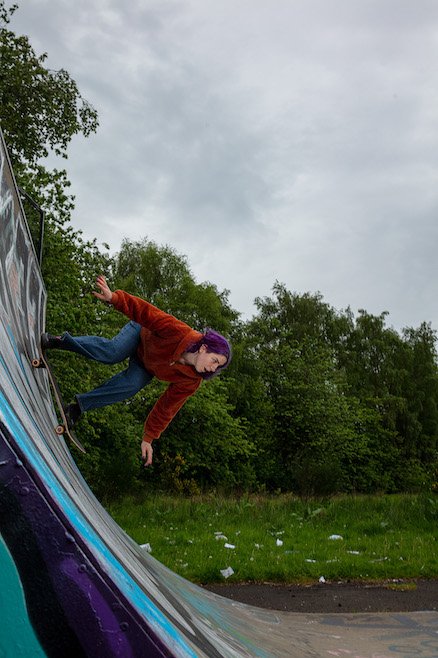Building Community on Four Wheels
The Southside’s skatepark, The Recs, has fallen into disrepair over the years. Greater Govanhill spoke with skaters about how consultation between skaters and Glasgow City Council could improve The Recs, and the importance of community built DIY spaces for urban sports.
By Samar Jamal | Photos by Alexander Hoyles
“The best feeling in the world is landing a trick.” Lynsay is a skater from Glasgow, who like so many began skating during the pandemic and has been addicted ever since. The above quote may sound like a cliché, but watching them skate, you can tell this isn't an exaggeration.
When everything shut down during the pandemic, a need to reconnect with the outdoors and carve out moments of normality led to some of us challenging ourselves on a four-wheeled plank of wood.
The necessity for accessible and safe green spaces for the sake of physical and mental wellbeing also became significantly more apparent during lockdown. Spending on green spaces may have reduced, but with Queen’s Park on our doorstep, Govanhill still boasts plenty of outdoor room. Concerns arise however when purpose built spaces are not maintained or are not built with users in mind.
Queens Park Skate Park & Vert, also known as ‘The Recs’ (or sometimes ‘The Wrecks’) is an example of this. Despite being included as one of the main features of Queens Park in Glasgow City’s Development Plan for 2017-2018, the conditions of the park’s ramps and famous skate vert have stayed very poor and the space doesn’t meet the needs of the skaters.
Someone who isn't familiar with skate culture may struggle to understand what a space that meets the needs of a skater looks like, and why it's necessary. But as someone reasonably new to the activity, it became evident to me early on that although skating is an individual sport, there is an overwhelming sense of community around it. Whether that feeling comes from the friends you skate with or the encouragement and praise you get from strangers at the park. The experience that comes with skating can feel as meaningful as skating itself. So when skate parks, like The Recs, are made without spaces to sit and socialise, you aren’t able to create connections and enjoy the social aspect.
Glasgow has a large skate community, Queer Skate Collective is one of the groups that provide an inclusive and sober skating space for all queer folk. Lynsay one of the people behind the collective, explained how they first got started:
Essentially, I had always been interested in skateboarding, it had always had a presence in my life, primarily through my brother who used to skate with his friends. He had a skateboard in the house and I would sit on it on my bum and try to roll down a hill on it.
Despite the skating scene feeling quite intimidating and being largely saturated with cishet men, lockdown finally gave Lynsay the time and encouragement to begin the sport. They have now been passionately skating for three years and feel that it has a massively positive impact on their mental wellbeing
Skateboarding, and having a community that I’m part of, has a massive role to play in my mental health. It makes me feel connected to my body, it’s literally like dancing. When I’m not able to do it, it’s like this massive part of my life is missing and I’m longing for that. It’s good for your soul.
You’ll find skaters like Lynsay all across Glasgow. In the West End, you can see them waxing up the obstacles at Kelvingrove skatepark or the steps at Kelvingrove Art Gallery. They are a creative bunch who will find a spot and set up shop if they see it has the potential to land a trick. Often this is by choice as skating defies the conventional purposes of the city. Arbitrary city objects like the benches or stairs at Langside Hall are transformed into skating obstacles through a simple grind (sliding down an edge) or ollie (jump). Equally, it can be the result of their local skate park becoming neglected and being unsuitable to skate on. The Recs is a prime example of this.
The area is littered with broken glass and the asphalt is rough, making it painful to fall on and difficult for a beginner to practise. In 2021, Skateboarding Scotland (Scotland’s official skateboarding body) alongside skaters, reported the condition of one of the obstacles to the council.
Initially, like much of the park, it had been mended by skaters but eventually required professional repair so they reported it to the council for it to be fixed. Niall was one of the skaters that raised the issue: “There was a small set of ramps that were falling into disrepair that people used quite a lot. A bunch of people requested that repairs be done and the council came and ripped it out.”
The removal of the ramps was an attempt to make the park safer. In reality, they have been replaced with a sizable area of broken ground. And the park has been left with one less obstacle, making it less appealing for users.
Commenting on the condition of the obstacles a spokesperson from Glasgow City Council said:
The metal equipment is nearing the end of its life and will require to be renewed, but we inspect the equipment regularly to ensure it remains safe to use at this time. Renewal of the equipment is beyond our current resources.
Where The Recs has failed, Kingston DIY and the Archies DIY have triumphed. These are both skateparks that have been built by skaters themselves and, unsurprisingly, meet the needs of their users. They are community built parks that include spaces for skaters to sit and socialise and an array of simple yet effective obstacles that provide for hours of fun. The parks are also adorned with graffiti and embody the art culture of urban sports.
Kingston DIY was also built alongside a community garden that fosters care and respect. The idea for a park under a motorway evolved from lockdown as the only indoor skating area, (The Loading Bay in Port Dundas, was closed due to restrictions.) Built under a canopy under the M8 motorway, Kingston DIY was created by local skaters who saw the potential for the area and spent their time and money transforming it from a dumping ground, into a safe skateable park for users of all abilities. But without the support of the council and professional builders, these areas do have some shortcomings. The Archies DIY, which is located in the north of the city often floods during the winter months making it impossible to skate on.
Patricia, a skater who grew up in the Southside says that the DIY element plays a large role in a parks popularity:
When I skated a lot I would go to Archies, those kind of DIY skate parks are popular because it's a group of skaters who have built it for everyone and I think because it's DIY it attracts lots of people because people are into that stuff.
Skating is an activity that embodies self-expression and fluidity and DIY culture grants the space to do this. Simultaneously, it is one of serious grit and determination and has recently become more recognised as a competitive sport as it was introduced in the 2020 Tokyo Olympics. However, this wouldn’t have been possible without athletes having safe, free and local space to begin skating.
The Recs is a designated space in the local community that has the potential for improvement. For many new skaters in the Southside, it could be the spot that nurtures their talents and gives them a chance to land their first trick. Although it is lacking in many ways there are reliable solutions to transform it and ensure it doesn’t remain neglected.
Skaters and nonskaters alike are seeking repairs to be carried out at the park. A Change.org petition, urging the council to repair the park was set up last year and has reached over 300 signatures. One of the supporters wrote that the park “is a very valuable asset for the community.”
Lynsay shares their vision for The Recs:
The council could make it a community project made by people who want to build. When people build these spaces they are more connected to them and more likely to care about them. Community needs to be at the heart of the space.
Transformative spaces like Kingston DIY and the Archies DIY are inspiring similar projects, such as the Devon Street Urban Park. Located in the Southside in a vacant space under the M74 motorway and Devon Street, the project hopes to revamp the area into an urban sports park with a green space for public art events and events.
It is managed by Glasgow Urban Sport and consultations for the project are planned to take place this summer. The project will be collaborative between the public who will be asked to review design proposals. will be residents to respond to an online survey to ensure that the space is created with consideration for everyone’s needs.
Rob Cusson from GUS said:
The project has the potential to enhance the sense of community and quality of life for people living in an area currently dominated by one of Scotland’s major motorways. The Urban Sports Park would create a new high-quality area of public realm, and a new landmark focal point within the Southside of the city, that encourages all generations to freely exercise and enjoy themselves within a vibrant and stimulating space.
The design of the park aims to meet a growing demand for urban sports, and will also incorporate space for public art, events and green spaces – ensuring a positive impact on the health and wellbeing of people living in the surrounding communities.
A spokesperson from Glasgow City Council said that they are working towards a similar collaborative avenue: The local area partnership has allocated funding from the Parks and Open Spaces Fund to commission a feasibility study that will include engagement with the local skating community, design work and input from a specialist supplier. The feasibility study will provide a detailed basis for bids to be made to the range of external funding sources that exist, including the crowdfunding option available through My Park Scotland.
There have been no additional details of when the study will be rolled out but local residents and skaters are eager to support the transformation of the space. Collaborative community action between residents and the Council could grant The Recs the much needed resources it requires and see it serve the needs of the community for years to come.
